Rod Miller's Blog, page 14
June 7, 2020
Really stupid words, Chapter 12.

For some reason I have never been able to discern, certain words and phrases spread like viruses and, seemingly overnight, become buzzwords, banalities, clichés, trite, and hackneyed.As so much of our discussion of late has turned to the spread of another kind of virus and the associated illness, there are a couple of phrases that are so overused they are making me sick. “New normal.” Was there an “old normal”? Is there even a “normal”? We live—as has humankind as far back as history can teach us—a fluid, ever-changing existence, where expectations are seldom realized and the unexpected is ever-present. “Normal,” whether new, old, or otherwise, seems meaningless in any concrete way. Now, perhaps, more than ever.Then there’s “game changer.” What started out as a sports cliché is now used to describe almost anything that might affect something. Or everything. The “things” involved don’t seem to matter. Nor does it matter that there is no game involved. If “game changer” was ever an apt metaphor, it has long since lost its power.Why not just say or write what you mean? Why not describe the behavior or activities that are changing, rather than tossing out meaningless twaddle like “new normal”? Why not explain the effect something will have rather than just calling it a “game changer” and leaving it at that?The answer is simple. Tossing around clichés is easier than thinking. The inability to think clearly, then speak or write clearly, seems to be the new normal. And that could be a game changer.
Published on June 07, 2020 11:41
May 26, 2020
A Thousand Dead Horses, Hobbled.
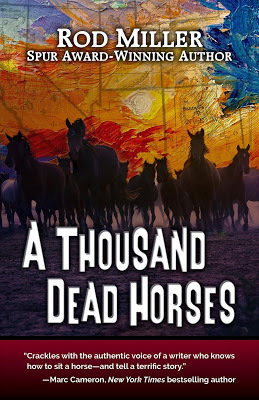
With most everything having been shut down over the past few months, Five Star, the publisher of my Western novels, has reined up the release of books, putting the whoa on them for six months. Which means they will not take the hobbles off A Thousand Dead Horses, scheduled for release this August, until February 2021. And, of course, the other books they have from me, And the River Ran Red, All My Sins Remembered, and This Thy Brotherwill likewise be delayed. Another of my publishers, Oghma Creative Media, where Saddlebag Dispatches magazine comes to life, and who will be releasing paperback, e-book, and audio editions of my earlier novels as well as an original “Rawhide Robinson” tale, and likely some other books, is also ground-tying their saddle stock while they figure out how to negotiate the trail ahead.The coronavirus mess has likely reached us all in some way. I learned recently a man from my hometown, who I grew up with, died of it. He’s the first personal acquaintance to do so—that I know of—and I hope he will be the last.Stay safe. And spend some of this down time in the pages of good book about the American West. It will be time well spent.
Published on May 26, 2020 11:18
May 17, 2020
Going walkabout.
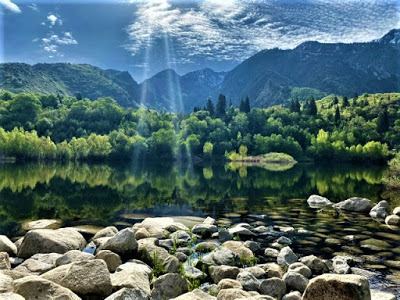
My home state is big, ranking thirteenth in land area of the 50 states. But when it comes to population, Utah ranks thirtieth. So, you might think we’re spread pretty thin here. However, we rank seventh in the nation in the percentage of our people who live in urban areas. Then again, only four of our 29 counties qualify as “urban.” Which means we are pretty tightly packed in a fairly small area. Eighty percent of our 3.2 million people live in a band some 25 miles wide and just over 100 miles long. The county I live in is home to more than a million people, on a land area that, if square, would measure just over 27 miles on a side. I can stand on my roof and see most of it. What’s the point? The point is, that despite it all, it’s easy to get away from it all in Utah. You can drive tens, scores, even hundreds of miles on mostly empty roads. Get off the road, and there are vast areas where you find little, if any, trace of mankind.A few days ago, we went hiking. My oldest daughter took the photograph above. You would be hard-pressed, I think, to find a more beautiful picture or place anywhere. It’s calm, it’s quiet, it’s restful, it’s serene.As the crow flies, it’s about three-and-a-half miles from my house. Three-and-a-half miles.
Published on May 17, 2020 09:20
May 8, 2020
Where I’m going, Part One.
 A few days ago while watching a movie I heard a snippet of “Never Been to Spain” by Three Dog Night. It was written by the late, great, Hoyt Axton and was a big hit back around 1971. The song, as they sometimes will, got stuck in my head. And it set me to thinking about all the places I’d like to go but have yet to see.As the song says, I’ve never been to Spain. And although I would not object to seeing Barcelona play at Camp Nou, a trip there isn’t really on my list. The fact is, most of the places I long to visit are much closer to home.For example, there’s Death Valley.I have visited places north, south, east, and west of there, but have never seen Death Valley. I fully intend to go there one day. Judging from photographs and reading, it’s a stark, harsh, barren place. Some people don’t appreciate such beauty, but I have come to. One can never imagine that dirt and rocks come in so many colors until you see the deserts of the American West. And, to imagine the suffering and hardships—and the joy—experienced by the Indians, the explorers, and the travelers who visited there in days gone by is inspiring. Especially when you realize they looked upon the same scenery you see today, and it is relatively unchanged.Death Valley, here I come. One of these days.
A few days ago while watching a movie I heard a snippet of “Never Been to Spain” by Three Dog Night. It was written by the late, great, Hoyt Axton and was a big hit back around 1971. The song, as they sometimes will, got stuck in my head. And it set me to thinking about all the places I’d like to go but have yet to see.As the song says, I’ve never been to Spain. And although I would not object to seeing Barcelona play at Camp Nou, a trip there isn’t really on my list. The fact is, most of the places I long to visit are much closer to home.For example, there’s Death Valley.I have visited places north, south, east, and west of there, but have never seen Death Valley. I fully intend to go there one day. Judging from photographs and reading, it’s a stark, harsh, barren place. Some people don’t appreciate such beauty, but I have come to. One can never imagine that dirt and rocks come in so many colors until you see the deserts of the American West. And, to imagine the suffering and hardships—and the joy—experienced by the Indians, the explorers, and the travelers who visited there in days gone by is inspiring. Especially when you realize they looked upon the same scenery you see today, and it is relatively unchanged.Death Valley, here I come. One of these days.
Published on May 08, 2020 08:26
April 27, 2020
Change the subject?
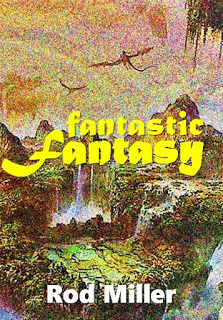
When I speak or present workshops at writers’ conferences, I always explore what other writers—both those attending the conference and other presenters—write about. With few exceptions these days, it’s fairies, or wizards, or vampires, or zombies, or witches, or elves, or dragons, or dwarfs, or demons, or space aliens, or other such make-believe things that do not exist in the real world. Even the “worlds” are mostly made up. I wonder why. What is the attraction of these non-existent, unrealistic, fantastical characters and the make-believe worlds they live in? What draws so many to write about them? What attracts so many to read about them? I have read a few such novels over the years, and most escape me in their appeal. Others are well written, enjoyable, escapist reads. But a little bit goes a long way. I soon find myself craving realistic landscapes, realistic characters, realistic conflicts, realistic lives, realistic rights and wrongs, and the ambiguity of the real world. Perhaps I would find more success as a writer if I invented pretend worlds and populated them with fantastical characters. But, for my money, fairies and dragons just can’t compare to cowboys and horses and cows and the American West. So, I guess I’ll stick to the subject.
Published on April 27, 2020 09:56
April 18, 2020
Celebrating Cowboy Poetry Week.
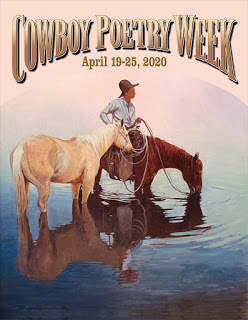
April 19 through 25 is Cowboy Poetry Week—a time to celebrate the poems and poets who honor cowboy life through poetry. Cowboy poetry is a long-standing tradition, stretching from the nineteenth century to our day, and destined to last as long as there are, or memories of, cattle and the horseback men and women who tend them.
The poem below is posted in observance of the seven-day jubilee. In spring and fall in the country where I grew up, v-shaped strings of Canada geese honked their way overhead as they migrated in spring and fall. The regularity of their flights reminded me of the cycle of cowboy work, specifically spring branding, and the gathering and shipping of beef cattle to market in the fall. And, the anticipation that accompanies the rhythms and rounds of nature and life and work. The Center for Western and Cowboy Poetryhas been, since the year 2000, and will continue to be, a driving force in preserving and promoting the poetry of cowboys. Your support will be welcome. Enjoy browsing the archives at CowboyPoetry.com, as well as regular postings on the Cowboy Poetry blog and on Facebook.
MIGRATIONS
I hear them in the evening winging northward— Their eager, maybe longing, kind of sound. It reminds me that we’ll soon be done with calving; That branding time ain’t far from coming ’round.
And I think how fall works really ain’t that distant; Shipping calves under sundown pewter skies Wherein arrowpointed flocks are winging southward, Trailing echoes of urgent, mournful cries.
Published on April 18, 2020 11:08
April 12, 2020
My Favorite Book, Part 22.
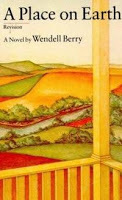
Wendell Berry is, and always has been, more committed to doing things right than in doing them quickly, or efficiently. If he is still farming in Kentucky at his advanced age, he will be farming with horses, as he has done throughout his life. And when he writes, he writes in longhand, with a pencil.He writes poetry. He writes insightful and challenging essays. And he writes fiction. All of it is worth reading. Not quickly, but attentively, and thoughtfully.Most of his fiction is about a made-up, but true, place called Port William, Kentucky. It is a farming community; a close-knit agglomeration of people, all with stories worth hearing. As much as his novels and stories are about people, they are about place, and how people and places are connected, and how those connections make our lives, and create the communities and world we live in. A Place on Earth is but one of many novels about Port William, this one set during World War Two. In its pages, you meet—more than meet, become acquainted with—many of the families and individuals of Port William of that day; families and people whose pasts and futures populate other Port William novels.There is one passage in A Place on Earth that seems to me to speak of the curious times we are living in today: “The life of the house will change, accommodate itself to the needs of the new life, and then in a few days the new will be learned, what once was unexpected will become a habit—and they will go on as before.”
Published on April 12, 2020 11:58
April 6, 2020
Curious times.
Published on April 06, 2020 11:35
March 30, 2020
Really stupid words, Chapter 11.
 It has long been a curiosity why, when we have perfectly good words in our rich language, we are so eager to jump on the bandwagon of the latest Rube Goldberg-concoction and turn it into a buzzword. A somewhat recent example: “Going forward.”Now, I am a soccer fan. And, for as long as I remember, “going forward” is what a soccer team does when it is on the attack. It’s a simple, apt description of something or someone moving in a defined direction in the physical world.Nowadays, it has become almost standard vernacular used to describe something else. And the description is not nearly so apt, if it is apt at all. We used to say, “in the future” or “from now on” or, if you wanted to sound pretentious, you might say, “henceforth” or “hereafter” or “from this time forth.” All those words and phrases mean what they mean, cannot mean anything else, and are perfectly descriptive. “Going forward”? Not so. Then there’s the long-standing philosophical argument about whether time moves in a “forward” direction at all, or whether it moves around and around in a cycle. But we’ll leave that discussion to the philosophers. Years ago, in a meeting at the office, a coworker used “going forward” when it was still fresh and new. Afterward, I asked him why, and he said he did not know any other way to say what he meant. I guess he forgot that, as recently as the day before, he would have been perfectly happy to say, “from now on.”Stupid.
It has long been a curiosity why, when we have perfectly good words in our rich language, we are so eager to jump on the bandwagon of the latest Rube Goldberg-concoction and turn it into a buzzword. A somewhat recent example: “Going forward.”Now, I am a soccer fan. And, for as long as I remember, “going forward” is what a soccer team does when it is on the attack. It’s a simple, apt description of something or someone moving in a defined direction in the physical world.Nowadays, it has become almost standard vernacular used to describe something else. And the description is not nearly so apt, if it is apt at all. We used to say, “in the future” or “from now on” or, if you wanted to sound pretentious, you might say, “henceforth” or “hereafter” or “from this time forth.” All those words and phrases mean what they mean, cannot mean anything else, and are perfectly descriptive. “Going forward”? Not so. Then there’s the long-standing philosophical argument about whether time moves in a “forward” direction at all, or whether it moves around and around in a cycle. But we’ll leave that discussion to the philosophers. Years ago, in a meeting at the office, a coworker used “going forward” when it was still fresh and new. Afterward, I asked him why, and he said he did not know any other way to say what he meant. I guess he forgot that, as recently as the day before, he would have been perfectly happy to say, “from now on.”Stupid.
Published on March 30, 2020 08:27
March 20, 2020
New news and newer news.
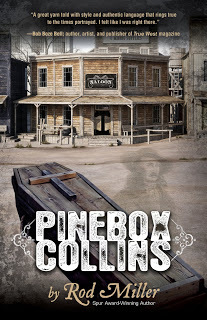
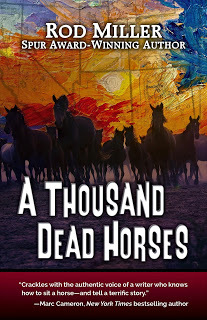
The release of my newest novel, Pinebox Collins , is days away. It’s about a one-legged itinerant undertaker in the Old West. In his travels from place to place, Jonathon “Pinebox” Collins sees the West grow and change. He spends time in cowtowns, mining boomtowns, small towns, and thriving cities. And he crosses paths with some of the wildest characters the Wild West has to offer, including “Wild Bill” Hickok.Next in line, slated for release in late August or early September, is my newer novel, A Thousand Dead Horses. That’s the cover, above, seen here in public for the first time. Set in 1840, it is based on a historic horse-stealing adventure, when mountain men and Ute Indians followed the Old Spanish Trail to California and robbed ranchos there of some 3,000 horses and mules, many of which did not make it across the Mojave Desert alive. These books are going to need shelves to sit on, so please make room on yours. Thank you.
Published on March 20, 2020 08:25




